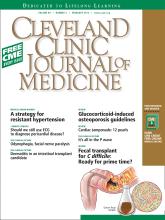Table of Contents
From the Editor
- A weirder than weird story, and yet…
Fecal microbiota transplantation is an evolving story that may seem weird but is worth following.
The Clinical Picture
- Odynophagia, peripheral facial nerve paralysis, mucocutaneous lesions
A 54-year-old woman presented with a 7-day history of odynophagia, pharyngeal swelling, and painful skin lesions on her ear. What does she have?
- It’s all in the P wave
A 49-year-old man with rheumatic mitral valve stenosis presents with worsening exertional dyspnea, fatigue, and cough. What can his electrocardiogram tell us?
- Dermatitis in an intestinal transplant candidate
Cultures of biopsy specimens were negative. What is the cause of this patient’s lesions?
Editorial
- Functional anatomy of the facial nerve revealed by Ramsay Hunt syndrome
Facial paralysis in association with a rash on the ear, tongue, or hard palate reflects geniculate zoster and requires immediate antiviral treatment.
Medical Grand Rounds
- Resistant hypertension: Diagnostic strategies and management
A 37-year-old woman was referred for help with managing difficult-to-control hypertension. Does she have resistant hypertension? How should her condition be managed?
1-Minute Consult
- Should we still use electrocardiography to diagnose pericardial disease?
Acute pericarditis has a unique clinical presentation, physical findings, and electrocardiographic changes.
Review
- Fecal microbiota transplantation for recurrent C difficile infection: Ready for prime time?
If you had a serious disease, would you agree to an alternative treatment that is cheap, safe, and effective—but seems disgusting? Would you recommend it to patients?
- Cardiac tamponade: 12 pearls in diagnosis and management
Tamponade shares symptoms and signs with other, more common diseases. Consider it when the patient has chest trauma or a chronic medical illness that can involve the pericardium.
- Recent recommendations on steroid-induced osteoporosis: More targeted, but more complicated
Whenever a patient begins glucocorticoid treatment, we need to think about bone loss. The current guidelines from the American College of Rheumatology are more targeted than in the past but may be harder to use.




